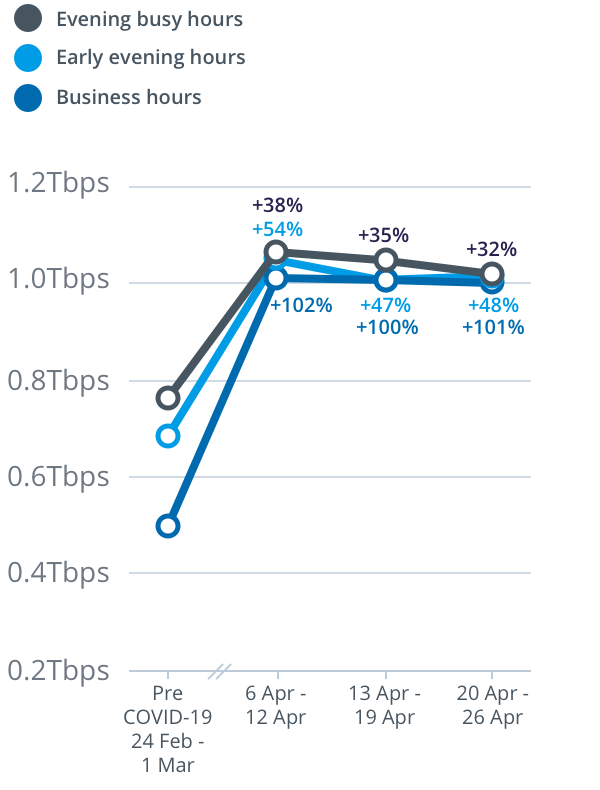
Coronavirus (COVID-19) and nbn: latest updates, working from home tips and FAQs
On this page:

NBN Co extends additional capacity offer to internet retailers and targets low-income household measures
Friday 4 September 2020 at 12:27pm
The 40 per cent additional capacity offer was introduced by NBN Co in March 2020 to support the nation’s additional data demands as more people relied on their home broadband connections for work, study and entertainment.
Following feedback from internet retailers, NBN Co will extend the 40 per cent additional capacity offer (where available, depending on access technology) at no additional cost to participating retailers (based on the February 2020 baseline) until 30 November for bundled discount plans.
NBN Co is also extending its offer to increase the fair use thresholds for its standard Sky™ Muster satellite service to 90GB* of wholesale download data on average per user across a rolling 4 weekly period, depending on the services the retailer has ordered from nbn, until 30 November 2020.
This offer, which came into effect at the end of March, adds 45GB* to the applicable fair use rolling 4 weekly threshold for each standard Sky Muster™ service at no additional cost to internet retailers.

NBN Co recently extended its Education Assistance offer for unconnected low-income households with online schooling needs until 15 January 2021. It also broadened the ‘Illuminate’ (First Timers’) wholesale discounts for premises that have not yet connected to the nbn™ network and have passed 18 months since their premises was able to connect, or have disconnected after having an active service and have been inactive for more than six months.
Over the past nine months, NBN Co has invested heavily in supporting the industry through various measures. These include forgoing revenue, increased data allocations, capital investment in network capacity augmentation and the provision of additional capacity inclusions.
Further, as previously announced, NBN Co is offering a $150 million financial relief and assistance package to help internet providers support residential and business customers facing financial hardship as a result of the pandemic.

Low-income support package
As part of the package for low-income households, NBN Co has extended its Education Assistance offer until 15 January 2021. The extension of the Education Assistance offer means unconnected low-income households with online schooling needs have access to this support for a further three and a half months. Under the offer, NBN Co waived its $37 monthly wholesale charge for internet providers for many services on the 25/5 Mbps speed tier.
NBN Co is also broadening the Illuminate offer to allow retailers to migrate existing Education Assistance customers onto the Illuminate offer for 12 months at the expiry of the COVID Education Assistance package on 15 January 2021.
Illuminate provides retailers a 50 per cent discount on the effective wholesale charge of most nbn speed tiers for premises that have not connected to the network and have passed 18 months since their premises was able to connect, or have disconnected after having an active service and have been inactive for more than six months.
Under the Illuminate offer, internet providers will have access to a 50 per cent discount on the wholesale price of most fixed line and fixed wireless bundles for a period of 12 months.

NBN Co Chief Customer Officer, Brad Whitcomb, said:
“Following feedback from internet retailers over the past few weeks, we have decided to extend our offer of additional capacity for another 10 weeks and will be extending further measures to help make broadband even more affordable and accessible to low-income households.
“We also recognise that many Australian households are under financial pressure, particularly low-income households. Therefore, we are concentrating our efforts to help lower-income households continue to have access to affordable broadband services.
"This includes extending the Education Assistance program for unconnected low-income households with school-aged children and broadening the Illuminate 50 per cent discount offer to retailers so they can continue supporting their existing customers who signed up the Education Assistance offer earlier this year.
“To date, NBN Co has invested heavily to support the industry through various measures such as the wholesale pricing and inclusion changes over the past nine months and we have maintained the offer of additional capacity for seven months to help internet providers adjust to changes in demand.”

nbn information sessions now available online
Monday 18 May 2020 at 10:50AM
From Monday 18 May, information sessions with nbn™ Community and Brand Ambassadors will be available online…
You’ve likely seen them in the pre-COVID-19 past at a shopping centre, local event, or maybe they’ve dropped in on your community group for a cuppa and a chat: nbn™ Community and Brand Ambassadors.
A familiar sight around the country, our knowledgeable ambassadors are used to getting out and about – from the smallest towns to the biggest cities – to speak with fellow Australians about the nbn™ broadband access network.

Our ambassadors go virtual
With face-to-face activities, like these, having been paused due to the COVID-19 crisis, nbn™ Community and Brand Ambassadors are now practicing what they’re used to preaching by taking their valued information sessions online.
From Monday 18 May, two key programs will be on offer – online – to members of the public:
nbn 1:1 session

nbn Community session

Beware of scams reminder to Australians
Thursday 7 May 2020 at 10:25AM
This week is Privacy Awareness Week, so what better time to remind Australians to beware of scams.
With a marked increase in predatory scammers attempting to steal personal details and commit fraud, we’re reminding Australians to be extra vigilant about their online security.
“As we spend more time online, it is important we do not become complacent when it comes to online security as scammers prey on human emotions, like fear and uncertainty, to trick people,” says Darren Kane, Chief Security Officer at nbn.
Scammers are using the reliance on connectivity during the COVID-19 pandemic to mislead people into thinking their service over the nbn™ broadband access network will be disconnected if they don’t provide a ‘technician’ with online access to their computer.
“With scammers increasing their efforts to use COVID-19 to steal people’s personal or financial details, we are starting to see the emergence of nbn related COVID-19 scams, so we are working with agencies like Scamwatch to continue to monitor the situation and alert the community,” says Darren.
Tips for working securely at home
- Protect your work laptop or devices by only using them in secure areas and by locking the screen when you’re away from the device.
- Don’t allow family to use your work devices or passwords as they could accidentally erase or modify important work information, or unknowingly infect your device.
- Protect your home wireless network with a password and change the default administrator password on your home router using its instruction guide.
- Never reuse passwords – if one site is compromised then others are too. Consider a password manager if you’re finding it complicated to keep track of your passwords.
- Devices should never be left where others can see them (e.g. inside a car if you decide to duck down to the shops, or visible within a room if someone is walking past a window at street level.)
- Shred documents to dispose of them securely. If you don’t have access to a shredder, store the documents safely until you can return them to work and dispose of them in secure bins.
- It’s best to avoid using free Wi-Fi hotspots for work-related business. These are often unsecured and the data you transmit can be snooped on by others.
- If possible, enable multi-factor authentication (MFA) whenever possible. MFA uses your password, but also adds a second step, such as a code sent to your phone or an app that generates the code for you as an extra layer of security.
- Keep personal information safe by installing the latest software and updating apps to protect your personal devices from the latest threats.
“Working remotely means you are likely to be in a different environment than your usual office location, so it is important to not get complacent when it comes to the security of work devices and documents.
“It is important to not click on the links or attachments in suspicious emails and never respond to unsolicited messages. This is even more important for all of us that are working from home, as scammers are on the hunt for ways to get access and disrupt home and corporate networks.”
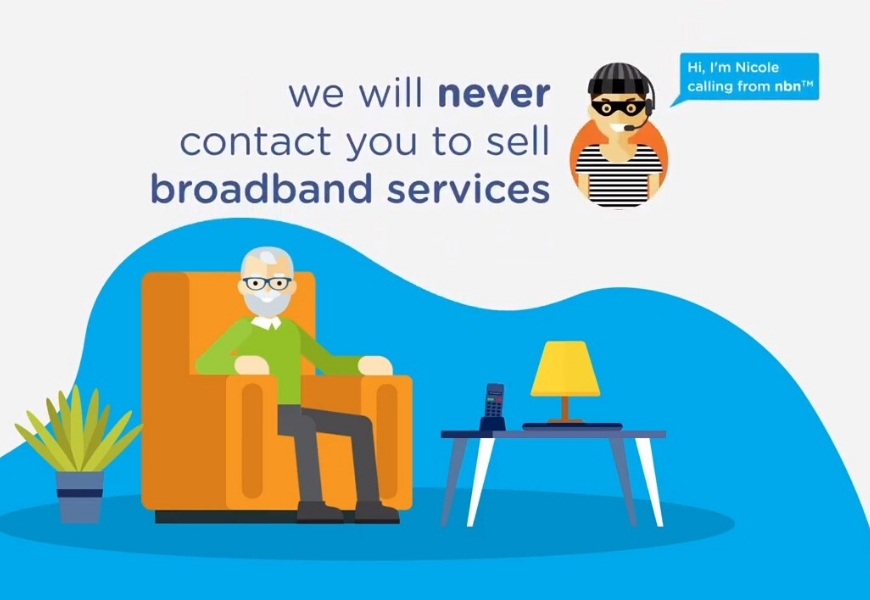
Tips for protecting against scammers
- Visit our website for information on how to identify and avoid potential scammers or for advice if you suspect you have been scammed.
- Remember, nbn will never call and ask to access your computer or advise that you’re going to be disconnected. nbn is a wholesaler, which means we don’t sell phone or internet services directly to the public.
- Never give an unsolicited caller remote access to your computer or devices via the installation of programs, such as Team Viewer.
- nbn does not make automated calls, such as robocalls, to advise of disconnections to nbn or existing copper phone line services. Do not engage with these calls.
- Do not share your financial information (i.e. bank, credit card or gift card details) or personal details with an unsolicited caller or door knockers trying to seek payment for an nbn™ service.
- If in doubt, hang up and call your retail service provider on their official customer service centre number to check if the call is legitimate. Do not use contact details supplied by the caller.
Offering relief to Australian businesses impacted by the COVID-19 pandemic
Tuesday 5 May 2020 at 10:10AM
Amidst the uncertainty and challenges that the world faces due to the COVID-19 pandemic, there is no question that many business owners are facing some tough times.
As COVID-19 disrupts everyday routines, businesses have been adapting to support their teams work remotely and take more business operations online. Many others are facing considerable financial hardship.
On Friday 17 April, we announced a $150 million COVID-19 relief and assistance package to help internet providers support customers affected by the COVID-19 pandemic. The relief fund aims to help internet providers:
- connect low-income households with home schooling needs
- support emergency and essential services
- assist small and medium-sized businesses and residential customers facing financial hardship
CiscoChat Podcast: Bandwidth management and support for remote working
Listen now:

With connectivity more important than ever, we are ensuring small and medium businesses stay connected by providing financial support to internet providers, who can help customers struggling to pay some or all of their monthly bills.
Due to increased demand of essential and emergency services, including telehealth providers, we are offering internet providers enhanced service levels, prioritised connections and fault resolution, and speed boosts for telehealth providers.

Our package of business assistance to internet providers includes:
- Providing financial support on wholesale monthly charges for small and medium businesses facing financial hardship due to COVID-19 and unable to pay some or all of their monthly bill for their nbn™ powered plan. This will help service providers to maintain their connection during this period.
- Waiving wholesale monthly charges for new connections of specified wholesale business-grade services before 31 December 2020, with charges waived to 31 January 2021. This will help businesses to re-establish themselves when the pandemic passes.
- Providing enhanced fault rectification service levels as well as prioritised connections and fault resolution for essential and emergency service organisations, including telehealth providers, via case management through nbn’s Business Operations Centre, to assist with service continuity.
- Offering a speed upgrade for telehealth providers on plans based on the 12/1Mbps or 25/5Mbps wholesale speed tiers to plans based on the 50/20Mbps, 25/5Mbps or Fixed Wireless Plus wholesale speed tiers where available at no additional wholesale charge. This will help to ensure telehealth providers have the capability to manage anticipated increase in video and audio telehealth consultations during this period.
As an essential service organisation, they will also be eligible to receive enhanced fault rectification service levels; prioritised connections and fault resolution via case management through nbn’s Business Operations Centre at no additional charge. If the telehealth provider is a small or medium business, they may also be eligible for other assistance available to small and medium businesses.
- NBN Co will also continue to engage with industry to develop useful information and resources to assist small and medium businesses maintain business continuity while working from home, including through its support of the Australian Business Continuity Portal recently launched by the Australian Information Industry Association.

NBN Co exists to help Australian households and businesses make the most of the benefits of high-speed broadband. Our commitment, as the team behind the nbn™ access network, is to ensure we can support Australia through this time of crisis – so that when it is over, we all emerge in a position of strength and resilience.
We have been delighted in the response from internet providers to sign-up to pass on our relief measures to business customers. To understand what is being offered and the options available to them, I recommend that businesses check with their internet provider, bearing in mind that they are currently experiencing high call volumes.
How will the measures be implemented?
For how long will the measures be available?
What if there’s more than $50 million in demand for the waived charges for small and medium businesses?

What is considered an essential, emergency or telehealth premises?
Phone and internet providers will use our following definitions to identify these premises:
Essential Services
- Defence force functions and prison systems
- Personal emergency services staffed 24 hours a day, such as Lifeline, State Emergency Services, Crisis Line and Poisons Information Line
- Healthcare services including public health services, telehealth premises services and other medical supply services. For example, for production, supply or distribution of pharmaceutical products
- Food suppliers, such as supermarkets and convenience stores
- Education, such as schools, universities and TAFEs
- Telecommunications services, including those providing infrastructure, voice and internet services
- Key public utilities, such as energy, power, fuel, water, sanitation, waste removal and welfare
- Financial institution’s services, including banks and credit unions
- Public transport, including those transporting people and freight
Emergency Services
- Ambulance services
- Fire-fighting services
- Police or law enforcement services
Telehealth Premises
A registered business premises used by an appropriately qualified service provider to offer any of the following telehealth medical consulting services, using voice or internet services over the nbn™ broadband access network:
- General Practitioner services
- Medical specialist services
- Nurse practitioner services
- Mental health treatment
- Chronic disease management
- Aboriginal and Torres Strait Islander health assessments
- Eating disorders treatment
- Pregnancy support counselling
- Resident treatment in aged care facilities
- Disability services
nbn extends offers by two months
Thursday 30 April 2020 at 12:50PM
To help Australians stay connected through the COVID-19 pandemic, nbn is extending its offers to provide up to 40 per cent additional capacity to internet providers at no extra cost, and increase download data limits for its standard Sky Muster™ service, for another two months.
The extended offers come as data demand on nbn’s main wholesale service continues to remain at higher levels than its pre-COVID-19 baseline (the last week of February).
“We are extending these offers by another two billing periods because we know how crucial it is for the nation to have access to reliable and fast broadband services as Australians continue to work, study and be entertained at home,” said Brad Whitcomb, Chief Customer Officer – Residential at nbn.

40 per cent additional capacity offer
Launched in March, the 40 per cent additional capacity offer was for three months through to May but will now extend by another two billing periods through to July 2020.
The offer gives internet providers pricing relief for up to 40 per cent more Connectivity Virtual Circuit (CVC) capacity, where available and required, to respond to increased COVID-19 related user demand.
What is Connectivity Virtual Circuit (CVC)?
Sky Muster™ download data limits offer
nbn is also extending its offer to increase download data limits for its standard Sky Muster™ service to 90GB* of data on average for another two months. This offer, which came into effect at the end of March, provides an additional 45GB* for each standard Sky Muster™ service at no additional cost to internet providers.
“Whether it’s through this additional up to 40 per cent capacity available to internet retailers at no extra cost, our support for Sky Muster™ customers, or the $150 million of financial relief and assistance we recently announced to help keep low-income households and small and medium businesses facing hardship stay connected, nbn is here to support internet providers and Australians through this pandemic,” says Brad.
The offer to increase data limits for standard Sky Muster™ services will, in some cases, effectively double the average monthly download limits on retail plans offered to many standard Sky Muster™ customers. However, it will be left to internet providers to decide how they implement this for their customer base.
The latest from the Australian Broadband Data Demand report
Meanwhile, the peak download throughput on the main wholesale service recorded in the early evening hours for that same week increased 17 per cent to 11.5Tbps compared to the pre-COVID-19 baseline.
The peak download throughput on the main wholesale service in the evening busy hours increased by 13 per cent to 12.5Tbps.
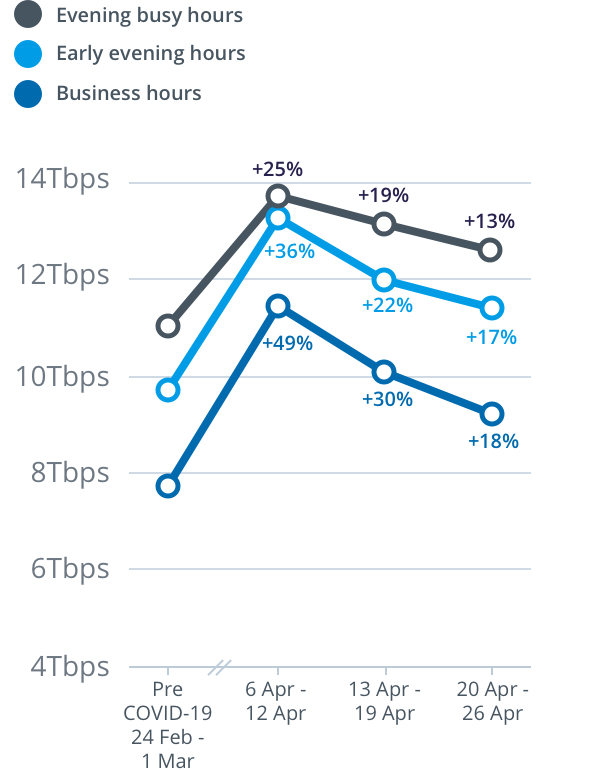
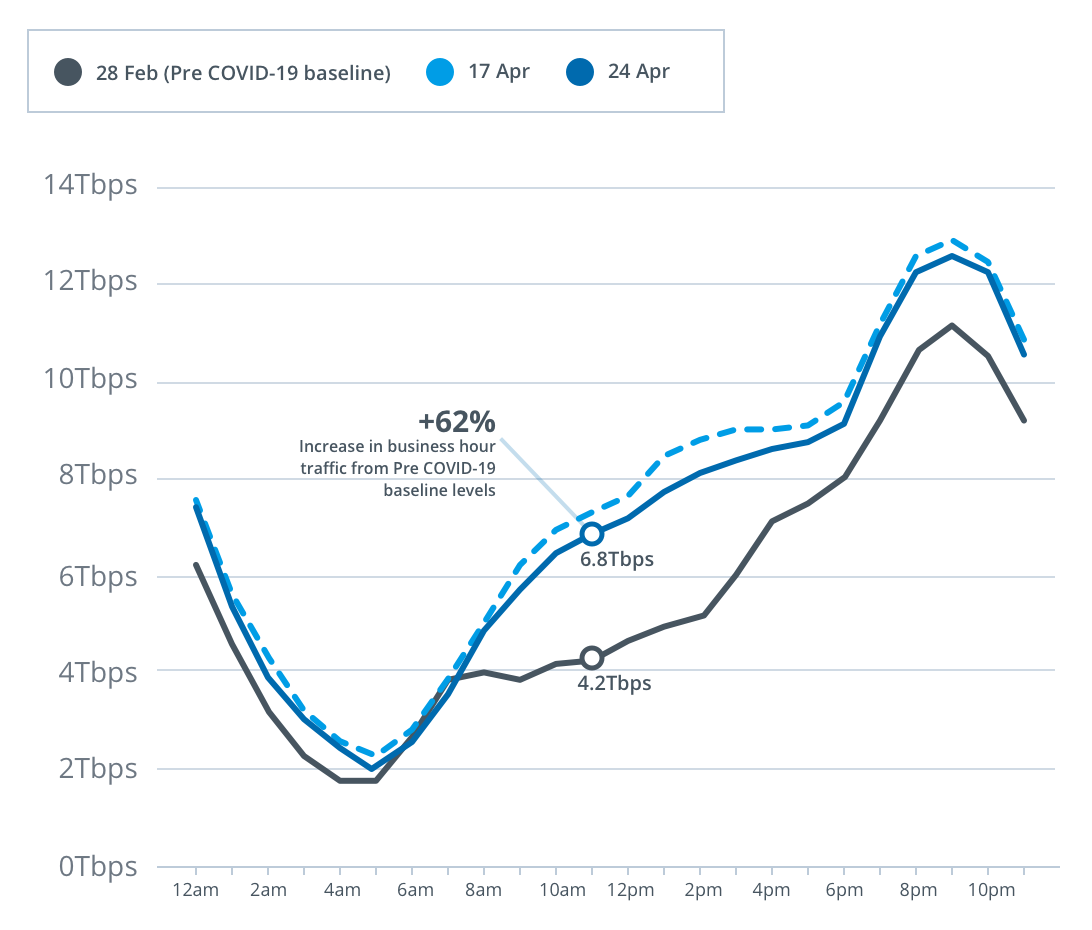
“These metrics show that while broadband use has significantly increased during this pandemic, we have also seen network demand settle into a new range where usage remains at higher levels throughout the day, compared to the pre COVID-19 baseline,” says Brad.
“We are seeing increased demand for higher speeds as customers reassess their demands during social isolation and make sure they have the broadband service to support it. It is always important to speak to your internet provider to ensure you are getting the broadband service you need to support your work, study and entertainment needs.”
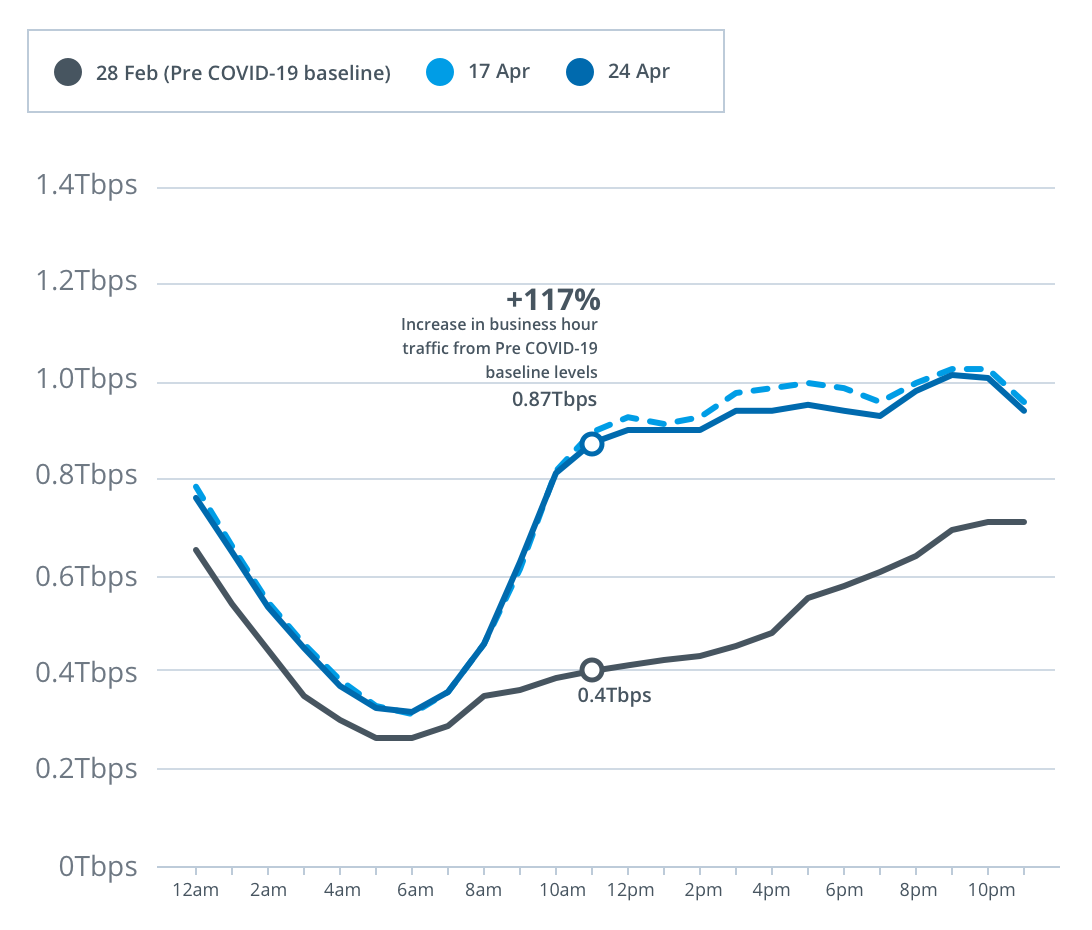
* nbn intends to engage with retail service providers and review demand on the nbn™ Sky Muster™ service following the data increase on a monthly basis and adjust the appropriate level of allocation if required.
• These metrics represent the upstream/downstream throughput peak each week, across the following three distinct periods:
o Business hours - Monday to Friday 8am to 4:59pm
o Early evening hours - Monday to Sunday 5pm to 7:59pm
o Evening busy hours - Monday to Sunday 8pm to 11:59pm
• For Business Hours, the peak is determined by taking the highest downstream throughput for our TC-4 service from the busiest 15 minute increment for downstream throughput, and from the busiest 30 minute increment for upstream, between Monday to Friday. The Early Evening Hours and Busy Evening Hours figures are recorded using the same methodology, but over a seven day period.
• TC-4 is nbn’s standard wholesale broadband service that is designed primarily for general internet and standard data services across all access technologies.
• NBN Co considers the throughput peak metric for our TC-4 service as the most appropriate measure for growth in data flowing through the network as it shows when network use is at its highest in each defined period in a week for our wholesale access service most used for residential broadband services.
• This graph shows TC-4 usage (measured in terabits per second for both upstream and downstream) over a 24 hour period (using Australian Eastern Standard/Daylight time on the dates shown in the key). It compares the results from those two dates against a corresponding 24 hour period from nbn’s pre-COVID-19 baseline on 28 February 2020 (the last week of February). Each marker on the x axis represents an hour period in the day. The y axis shows, for each of the 60 minute periods in that 24 hour period:
o The downstream throughput measure calculated by recording the highest downstream throughput for our TC-4 service from the busiest 15 minute increment in that 60 minute period.
o The upstream throughput measure calculated by recording the highest upstream throughput for our TC-4 service from the busiest 30 minute increment in that 60 minute period.
• The terabits per second (Tbps) value is rounded to one decimal place. The percentage increase is rounded to the nearest whole number.
nbn's Paul Tyler speaks to ausbiz about business relief package
Tuesday 21 April 2020 at 1PM
Our Chief Customer Officer – Business, Paul Tyler, has appeared on ausbiz to share how the nbn™ broadband access network is performing during the COVID-19 pandemic, as well as how nbn is helping small and medium businesses to stay connected during this time of increased demand.
Watch the interview:
Latest weekly report shows upload demand on the rise
Friday 17 April 2020 at 1:50PM
Australian Broadband Data Demand – the report helping to keep Australians and internet providers informed about growing data demand over the nbn™ broadband access network – this week reveals upload demand is on the rise as more Australians work, and spent the Easter break, at home.
Published weekly, and now also including upload peaks, the report shows upload demand on nbn’s main wholesale access service has significantly increased compared to nbn’s pre-COVID-19 baseline, as Australians continue to rely on the national broadband network to support daytime business activities and real-time video communication between friends and family.
For Monday 6 April to Sunday 12 April, peak upload throughput (the measure of data flowing through the nbn™ access network) during daytime business hours increased by 102 per cent to 1.01 terabits per second (Tbps), compared to the last week of February, which nbn measures as its normal pre-COVID-19 baseline.
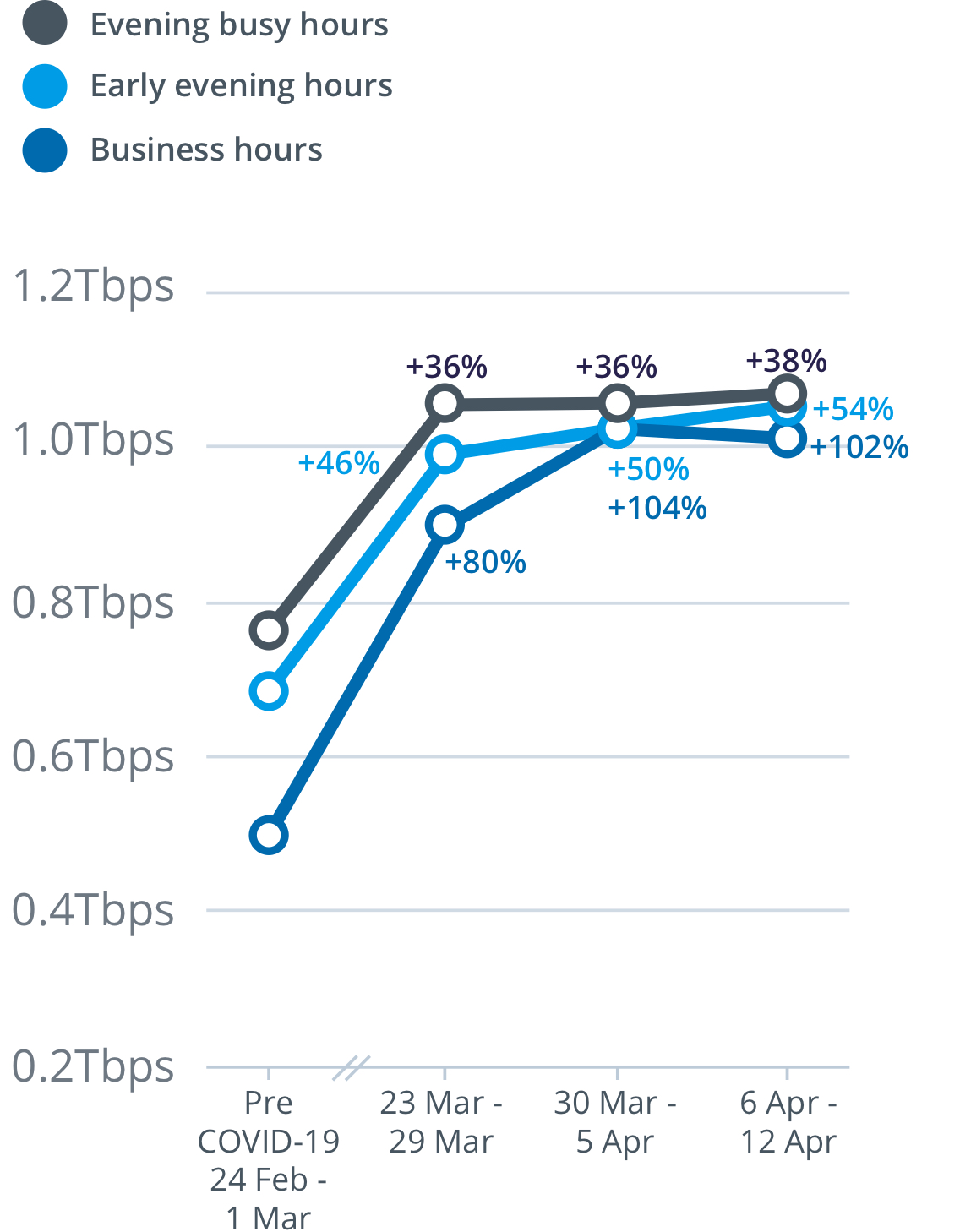

Compared to the pre-COVID-19 baseline, peak upload throughput on the main nbn wholesale service in the evening busy hours for the week beginning Monday 6 April increased by 38 per cent to 1.06Tbps, while peak upload throughput in the early evening hours increased 54 per cent to 1.05Tbps.
“Upload performance is critical for two-way video communication and for people trying to run their business from home. So if your business relies on faster upload speeds, we encourage you to talk to your internet provider to ensure you are getting the business-grade features – like priority data and enhanced service levels – to support your business needs,” says Brad.


The increase in uploads over the nbn™ access network comes as data demand surged on Good Friday (10 April), with an increase of more than 120 per cent in downstream throughput to 9.5Tbps during the daytime business hours, compared to the pre-COVID baseline. Uploads on Good Friday also grew strongly, increasing by 93 per cent to 0.77Tbps in the daytime business hours.
While download and upload demand on Good Friday significantly increased when compared to previous weeks, it’s important to note that, on public holidays, the nbn™ access network profile more closely resembles typical weekend usage when people are at home using their internet connections for communication and entertainment needs.

Compared to the pre-COVID-19 baseline, from Monday 6 April to Sunday 12 April:
- the highest weekly download throughput was 13.8Tbps, recorded on Wednesday 8 April in the evening busy hours, an increase of 25 per cent
- the peak download throughput recorded in the early evening hours was 13.3Tbps, an increase of 36 per cent
- the peak download throughput recorded during daytime business hours was 11.6Tbps, an increase of 49 per cent
That daytime peak of 11.6Tbps on Wednesday 8 April was the first time that download throughput in the daytime business hours surpassed the pre-COVID-19 baseline evening peak of 11Tbps.
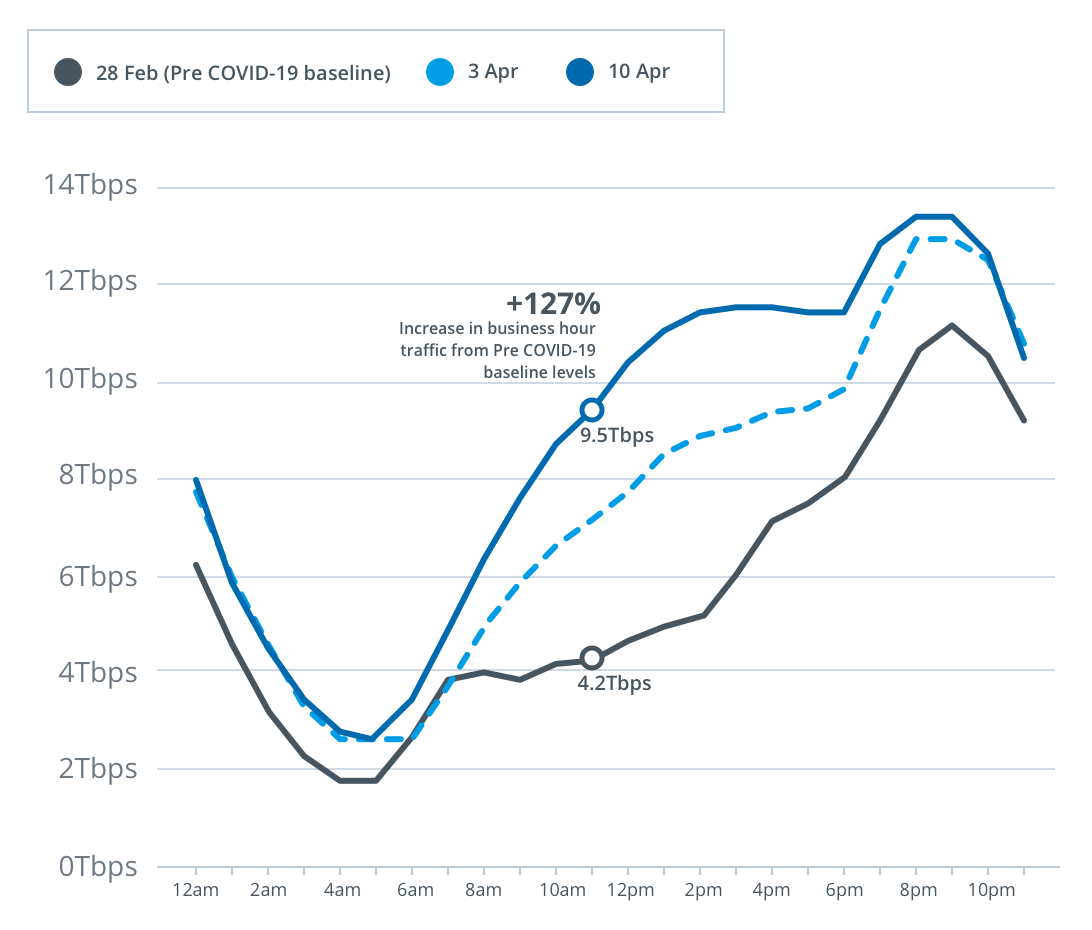
The increases in download and upload throughput (when compared against the pre-COVID-19 baseline) come as orders for higher-speed nbnwholesale plans gather pace.
“As uploads and downloads increase, we have seen more orders for higher-speed nbn plans come through our internet provider partners,” says Brad.
“In the past week, 99 per cent of new nbn wholesale orders were on plans of 25Mbps or faster, with 69 per cent on 50Mbps and 16 per cent on 100Mbps or faster.
“These increases in data demand underline the importance of the nbn™ access network as it continues to support Australians working and studying from home.”
- These metrics represent the upstream/downstream throughput peak each week, across the following three distinct periods:
- Business hours – Monday to Friday 8am to 4:59pm
- Early evening hours – Monday to Sunday 5pm to 7:59pm
- Evening busy hours – Monday to Sunday 8pm to 11:59pm
- For Business Hours, the peak is determined by taking the highest downstream throughput for our TC-4 service from the busiest 15 minute increment for downstream throughput, and from the busiest 30 minute increment for upstream, between Monday to Friday. The Early Evening Hours and Busy Evening Hours figures are recorded using the same methodology, but over a seven day period.
- TC-4 is nbn’s standard wholesale broadband service that is designed primarily for general internet and standard data services across all access technologies.
- NBN Co considers the throughput peak metric for our TC-4 service as the most appropriate measure for growth in data flowing through the network as it shows when network use is at its highest in each defined period in a week for our wholesale access service most used for residential broadband services.
- This graph shows TC-4 usage (measured in terabits per second for both upstream and downstream) over a 24 hour period (using Australian Eastern Standard/Daylight time on the dates shown in the key). It compares the results from those two dates against a corresponding 24 hour period from nbn’s pre-COVID-19 baseline on 28 February 2020 (the last week of February). Each marker on the x axis represents an hour period in the day. The y axis shows, for each of the 60 minute periods in that 24 hour period:
- The downstream throughput measure calculated by recording the highest downstream throughput for our TC-4 service from the busiest 15 minute increment in that 60 minute period.
- The upstream throughput measure calculated by recording the highest upstream throughput for our TC-4 service from the busiest 30 minute increment in that 60 minute period.
- The terabits per second (Tbps) value is rounded to one decimal place. The percentage increase is rounded to the nearest whole number.
nbn announces $150 million COVID-19 relief and assistance package
Friday 17 April 2020 at 9:35AM
To help internet providers to support customers affected by the COVID-19 pandemic, nbn is establishing a $150 million financial relief and assistance fund.
The relief fund aims to help internet providers to:
- connect low-income households with home schooling needs
- support emergency and essential services
- assist small and medium-sized businesses and residential customers facing financial hardship
“We know that many Australian households and businesses are doing it tough, and that access to broadband services has never been more important,” says Stephen Rue, Chief Executive Officer at nbn.
“As a national wholesale provider of broadband services, nbn has an important role to play in supporting internet providers connecting families with remote schooling needs for their children and keeping Australian households, small and medium businesses, as well as essential and emergency services connected.”
Developed in consultation with more than 50 internet providers, government, and the consumer group Australian Communications Consumer Action Network (ACCAN), the fund is split as below:
- approximately $50 million will go towards helping internet providers to support low-income households with school-aged children who do not currently have an active nbn connection at home;
- $50 million towards the total support package for small and medium-sized businesses;
- and $50 million towards relief measures for residential financial hardship.

Helping low-income families
To help unconnected low-income families with school children get connected, nbn will waive its $37 monthly wholesale charge for internet providers for many services on the 25/5 Mbps speed tier between April and September.
This is intended to enable internet providers to create more affordable offers to connect these families as Term Two of school starts across the nation.

“We want to do what we can to ensure all school children have access to the internet during this period,” says Stephen.
To ensure the initiative reaches those most in need, nbn is working with the Department of Education and schools in each state and territory.
Helping essential and emergency services
nbn is also introducing a range of measures to build resilience for essential and emergency services, and telehealth providers as online demand for these services grows.
To help ensure service continuity, nbn will offer internet providers enhanced service levels, and prioritised connections and fault resolutions for these customers via case management through nbn’s Business Operations Centre.

Helping small and medium-sized businesses
nbn will provide financial support to internet providers for new connections of specified business-grade services, helping businesses to re-establish themselves when the pandemic passes.
“This package also aims to give small and medium businesses the resilience they need to stay connected and emerge in a position to grow again in the future and provide relief measures to help households and small and medium businesses who are facing financial hardship,” says Stephen.

CEO of ACCAN, Teresa Corbin, welcomed the announcement as an important step towards ensuring no Australian is left offline during the challenging months to come.
“The internet is an essential service for work, study, and accessing government and telehealth services,” says Teresa. “nbn is to be applauded for laying the groundwork to keep struggling families and households connected during this difficult time. We hope to see the nation’s retail service providers build on these foundations to deliver financial relief to those in need.”
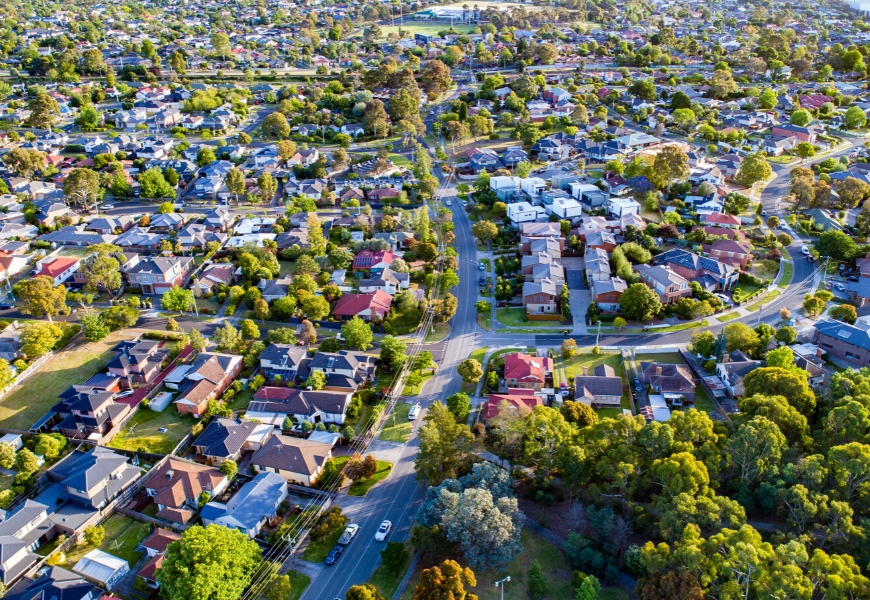
nbn's COVID-19 relief and assistance package will be made available to retailers in accordance with applicable terms and conditions from April to 30 September, with retailers to determine when and what offers they develop for their customers.
“Helping households get connected and supporting Australian homes and businesses stay connected is a priority for nbn. We are confident these funding relief and assistance measures will make a difference and help internet providers support their customers,” says Stephen.
nbn continues to support Australia through COVID-19: speech from CEO Stephen Rue
Wednesday 7 April 2020 at 10:30AM

"In these times of such uncertainty and economic disruption, it’s critically important that we don’t let the wide-ranging impacts of COVID-19 take over our lives any more than it already has.
Yes, it is disruptive, and yes, it will create serious economic shocks that will reverberate through families, industries and lives – likely for many years to come.
But while COVID-19 may disrupt our way of life, we must work together – as a nation and as an industry – to ensure it doesn’t destroy our way of life.
"This whole telecommunications industry is working incredibly hard right now to ensure that all Australians stay connected..."
This whole telecommunications industry is working incredibly hard right now to ensure that all Australians stay connected with their friends and loved ones, that businesses continue to operate as best they can, and that school children continue to access the vital tools, resources and lessons that they need to further their education.
While we may not be on the frontline fighting this virus and helping to save lives as Australia’s selfless healthcare workers are, there is no question that telecommunications is playing an absolutely vital role in keeping the nation connected through these difficult times.
Never before has the nation needed the telecommunications industry as it does today. And never before has the nation needed nbn as it does today.
Many countries around the world will be facing this crisis without the secure, resilient and fast broadband that nbn brings to homes, businesses and schools.
Indeed, had this crisis struck ten years ago, when the vast majority of the nation was stuck on a blend of old ADSL and dial-up connections, we as a nation would have been in an unthinkable position right now.
Instead, thanks in large part to the foresight of past and present governments, we have an nbn™ network that is more than 95 per cent complete; a network that has helped lift the digital capability of the nation and given millions of homes and businesses access to fast and reliable broadband services.
- More than 95 per cent of the nbn™ rollout is complete1
- Almost seven million homes and businesses are connected
- Average download speeds have more than doubled from 16 megabits per second in 2014 to more than 40 megabits per second today2.
- Data downloads have increased from less than 15 gigabytes a month, on average, to more than 300 gigabytes a month, on average.
It’s this access to speed and capacity on the nbn™ access network that is enabling families today to continue functioning in these surreal times. It’s allowing mums and dads to work online, from home, while their children stream the latest lesson from school, or relax with a movie when the time comes to unwind.
By the measures that matter most when it comes to bringing broadband to people – speed, ubiquity, and price – the nbn™ access network has risen to the challenge and I believe surpassed it.
But now we rise to meet a new challenge, as indeed does the whole nation.

For nbn, our challenge is to ensure that all Australians, no matter where they live or their circumstances, can connect to high-speed, secure broadband and continue to have access to the employment, education and entertainment opportunities that this technology enables.
We are using all of our resources and drawing on local and overseas expertise to help keep the nation connected, productive, educated and entertained through this crisis.
We have already seen significant changes to our network profile as more people work and study from home, and as they increasingly turn to the internet for entertainment and education.
"And importantly – even though we are seeing large increases in usage across the network – congestion, network faults and outages have remained at very low levels with no material increase compared to previous months."
Since social distancing measures were introduced, we have seen data demand across our network increase by more than 70 per cent during the daytime business hours. But even as we continue to see large increases in daily data consumption, we are not expecting daytime data consumption to surpass the evening peak period.
In the evening busy hours, when network usage peaks at around 9pm, we have seen network traffic increase by as much as 25 per cent.
While these increases are significant they remain well within the capacity headroom we have built into the network.

And importantly – even though we are seeing large increases in usage across the network – congestion, network faults and outages have remained at very low levels with no material increase compared to previous months.
It’s a remarkable effort and a great testament to all our people at nbn that the network continues to operate so well in these unprecedented times.
To me, it shows that nbn is well-prepared to handle Australia’s growing data needs at the time when the nation most needs it.
- Peak download throughput recorded last week in the evening busy hours has increased by 18 per cent from the Pre-COVID-19 benchmark to 13.1 terabits per second (Tbps)
- Peak recorded in the early evening hours has increased 21 per cent from the Pre-COVID-19 benchmark to 11.8Tbps.
- Peak measured in business hours (Monday to Friday from 8am to 4:59pm) has increased 24 per cent from the Pre-COVID-19 benchmark to 9.6Tbps.
- One terabit per second is equivalent to 1,000 gigabits per second or one million megabits per second.
It means school children can study from home. Their connection to the online world of education being the difference between studies continuing and a whole school year being lost.
It means doctors, with the aid of telehealth services, are treating countless patients without risking themselves with exposure to this insidious virus. This will have a real impact on saving lives, flattening the curve, and helping our health care system reduce strains on its people and systems.
It means more Australians can access the platform and technologies that keep us in touch with our friends and family. It means that those most at risk to COVID-19 can still order their groceries online, it means they can still communicate with their loved ones.

And it means we as a nation are keeping informed and entertained through online media, movies, games and audiobooks.
Ultimately it means that, while our lives might be temporarily isolated to the confines of our homes, we can stay connected and productive.
Podcast: Stephen Rue speaks with CEDA's Melinda Cilento
There’s no doubt that this crisis presents us all with our biggest test, but I believe it also presents our biggest opportunity.
We know that nbn and the industry will face challenges over the next months as so many people, confined to their homes, push network use to record levels.
This will only compound the importance of the nbn™ access network and the telco sector to the nation.
But it’s in these times of crises that I believe people are at their best, when incredible empathy, creativity and resilience become our defining features.
We’ve of course seen this absolute willingness to help, to collaborate for the benefit of the nation, play out before.
It was on display during the bushfires, it happened during floods, indeed it happens whenever disaster strikes.
By working together, I have no doubt that our industry will rise to this challenge and help the nation when it needs us most."
2 Your experience, including the speeds actually achieved over the nbn™ network, depends on the nbn™ access network technology and configuration over which services are delivered to your premises, whether you are using the internet during the busy period, and some factors outside nbn’s control (like your equipment quality, software, broadband plan, signal reception and how your service provider designs its network). Speeds may also be impacted by the number of concurrent users on the nbn™ Fixed Wireless network, including during busy periods. Satellite end customers may also experience latency.
Supporting Australia is our priority
Friday 3 April 2020 at 4:25PM
The current situation facing our nation brings with it an unprecedented increase in internet traffic being carried over the nbn™ network.
With a critical role to play in keeping you connected, we’re working with internet providers to ensure Australian homes and businesses have continued access to fast, reliable broadband both now, and as demand continues to increase.
We’re increasing capacity
We’re still on the ground
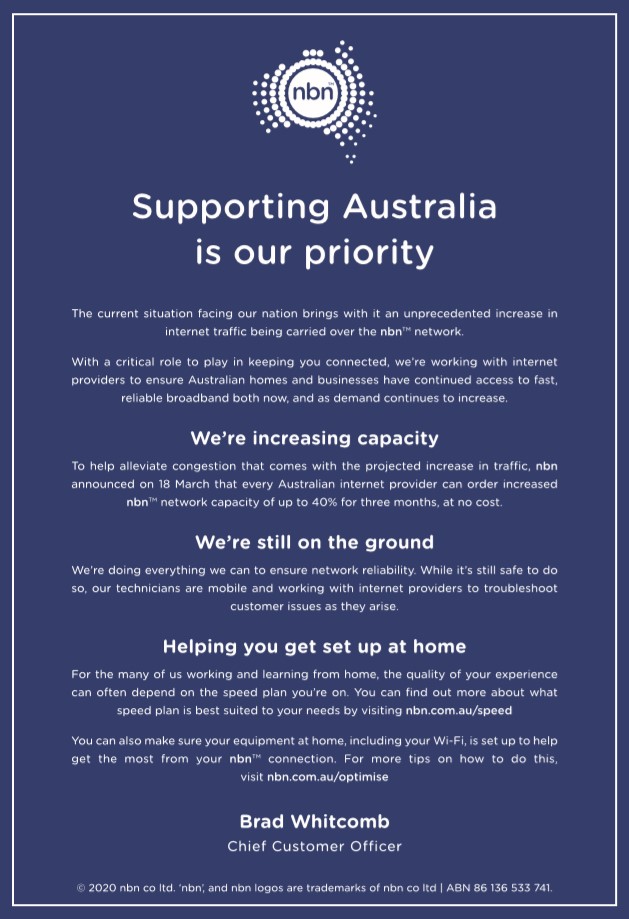
Helping you get set up at home
New weekly report reveals growth in nbn data demand
Thursday 2 April 2020 at 4:32PM
To keep Australians and internet providers informed about the growing data demand over the nbn™ broadband access network, nbn has launched a new report: Australian Broadband Data Demand.
Released weekly, the report is revealing significant increases in download peaks since the end of February. The report shows the highest throughput (the measure of data flowing through the nbn™ access network) recorded in a week during each of the following three periods: the daytime business hours, early evening hours and busy evening hours.
It comes as more Australians self-isolate and increasingly rely on services over the nbn™ access network to remain connected to work, school and higher education, as well as entertainment, family and friends.
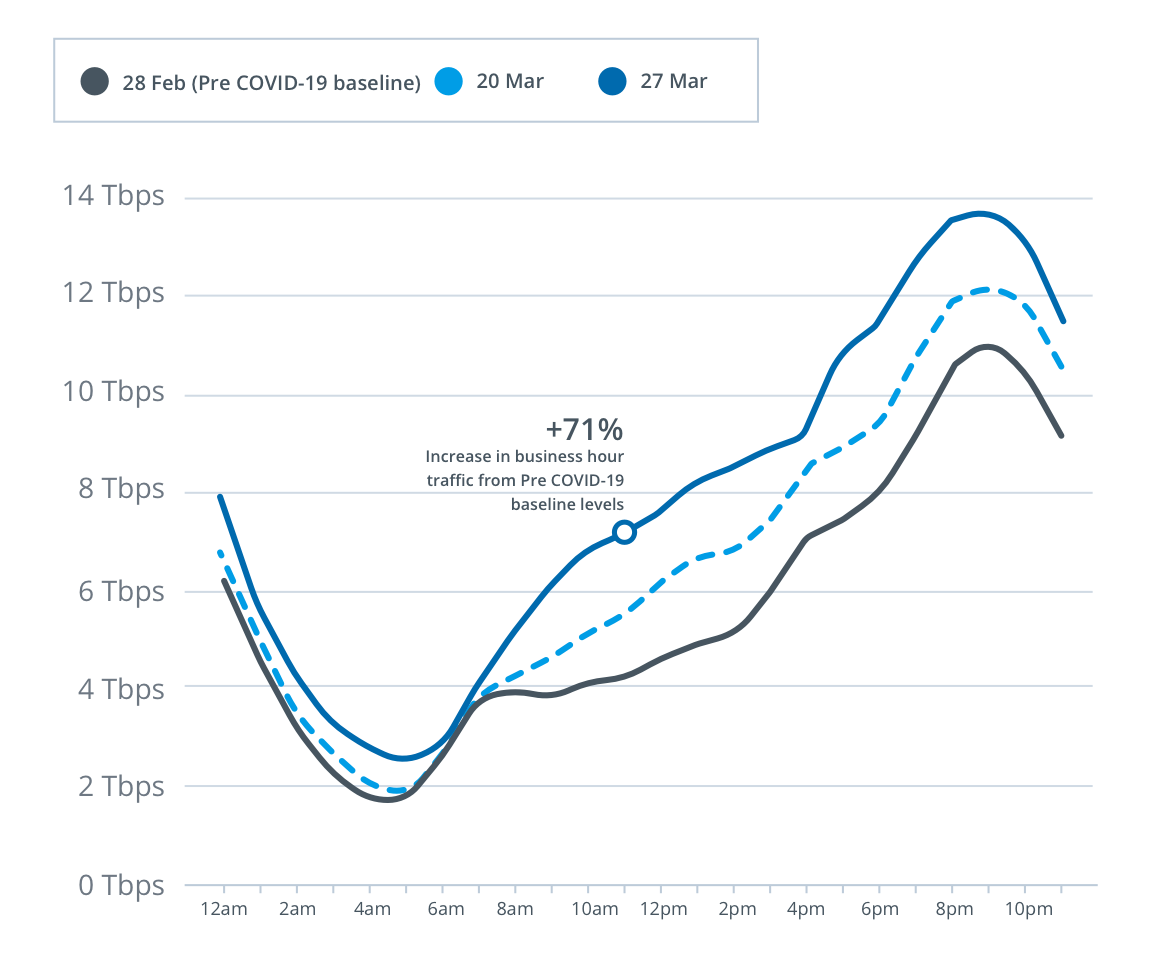


Since the last week of February – when social distancing measures were not yet in effect – the peak download throughput recorded each week in the evening busy hours has increased by 25 per cent to 13.8 terabits per second (Tbps).
The peak recorded in the early evening hours has increased 30 per cent to 12.8Tbps, and the peak measured in business hours (Monday to Friday from 8am to 4:59pm) has increased 21 per cent to 9Tbps. One terabit per second is equivalent to 1,000 gigabits per second or one million megabits per second.
“As more people start to work and learn from home, we’ve seen a substantial increase in the peak throughput on our main wholesale service during the daytime business hours, early evening and busy evening periods. And as we continue to see these increases in data demand, the network continues to perform well, helping internet providers to support the internet needs of Australian homes and businesses.”

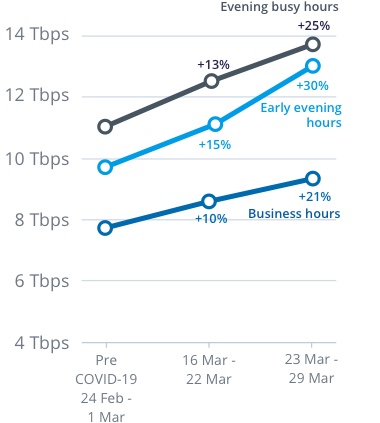
While the peak throughput recorded in the daytime business hours has steadily climbed, it remains below the busy evening period when the peak data throughput on the main wholesale service is at its highest. The increases in throughput in the busy evening period also remain well below the maximum capacity available on our network.
nbn considers the peak throughput metric as the most appropriate measure for growth in data flowing through the network, as it shows when usage is at its highest in each defined period.
While this new metric measures the difference between peaks (which may occur at different times in each defined period), since social distancing measures were implemented, traffic on the nbn main wholesale service has also significantly grown with business hours usage increasing by more than 70 per cent (as shown in the above graph at 11am).
Across all three time periods, nbn expects the majority of data usage to be mainly dominated by real-time video streaming, web browsing, social media and online gaming.
However, since the last week of February, there have likely been large increases in the use of video conferencing and business applications as more people work and study from home.
The nbn™ access network has been engineered to support large capacity increases today and into the future to support Australia’s broadband needs. And, as data demand has grown since social distancing measures were introduced to help slow the spread of COVID-19, services over our network have continued to perform well.
“We are very pleased that the network continues to operate well in these unprecedented times and is accommodating the increased data load. It shows the nbn™ access network is well-prepared to handle Australia’s growing data demand at a time when the nation most needs high-speed, reliable broadband,” says Brad.
Metric |
Tbps |
Peak |
Increase over pre COVID-19 |
Pre-COVID-19 – Business Hours |
7.79 |
26/02/2020 16:45 |
|
Pre-COVID-19– Early Evening |
9.81 |
1/03/2020 19:45 |
|
Pre-COVID-19 – Evening Busy Hours |
11.04 |
26/02/2020 21:30 |
|
Week prior to last week – Business Hours |
8.60 |
20/03/2020 16:45 |
10.38% |
Week prior to last week – Early Evening |
11.24 |
21/03/2020 19:45 |
14.60% |
Week prior to last week – Evening Busy Hours |
12.48 |
21/03/2020 21:00 |
12.97% |
Last week – Business Hours |
9.43 |
25/03/2020 16:45 |
21.06% |
Last week – Early Evening |
12.75 |
27/03/2020 19:45 |
29.99% |
Last week – Evening Busy Hours |
13.77 |
27/03/2020 21:15 |
24.71% |
Small Biz Matters with Chief Customer Officer – Business, Paul Tyler
Friday 27 March 2020 at 1:40PM

To provide updates on how the nbn™ broadband access network is handling changing connectivity demands as businesses transition their employees to work remotely, our Chief Customer Officer – Business, Paul Tyler, recently appeared on the Small Biz Matters podcast.
Chatting with host Alexi Boyd, Paul covers topics including:
- how nbn is ensuring its network stays ahead of demand
- differences between residential nbn™ plans and business nbn™ plans
- how users can get the most from their connection when working from home
nbn increases Sky Muster™ data allowances, enhances Sky Muster™ Plus
Wednesday 25 March 2020 at 11:15AM
At NBN Co, we are committed to supporting the needs of Australians in the time of the ongoing COVID-19 pandemic, no matter where they live or work. As part of this commitment, last week, we announced a capacity boost across the nbn™ access network for three months, to help Retail Service Providers (RSPs) support customers.
Today, we are unveiling new measures to support increasing capacity and data demand for our satellite services in regional and remote Australia.
These initiatives have been designed to support the requirement expected to be created as more people in regional and remote communities work from home and more children study remotely in the coming weeks.
Two key measures will see:
a) Customers on standard nbn™ Sky Muster™ services have their data download limits increased significantly
b) Customers on nbn™ Sky Muster™ Plus services have an increased range of applications not count towards monthly data quotas
Data download limits on nbn™ Sky Muster increased
From 31 March 2020, for a period of up to three months, nbn will increase the download data limits that apply to RSPs for the standard nbn™ Sky Muster™ service. This will provide an additional 45GB* for each standard nbn™ Sky Muster™ service at no additional cost to those RSPs to provide to their customers.
This additional 45GB will allow RSPs, in some cases, to effectively double the average monthly download limits on retail plans offered to many of their customers.
For an RSP’s standard nbn™ Sky Muster™ services, the average wholesale download limits will increase to 90GB* of data on average, depending on the services that the RSP has ordered from nbn and how each RSP passes on these benefits to their customers.
This offer is an effort to support the anticipated higher volumes of traffic as people work from home and conduct schooling remotely.
Expansion of unmetered content on nbn™ Sky Muster™ Plus
Effective 1 April 2020, on an ongoing basis, enhancements for nbn™ Sky Muster™ Plus plans will include an expansion of unmetered content.
Once these enhancements take effect, all traffic on nbn™ Sky Muster Plus plans will be unmetered, except for video streaming and traffic via a Virtual Private Network (VPN), both of which will continue to be metered.
Unmetered activities currently include web browsing, email and operating system updates. As part of these further enhancements, common social media applications such as Skype and Facetime will also be unmetered.
These are just a few examples of where customers can now have additional peace of mind that staying in touch with family, friends and colleagues will not count as part of their monthly data allowance.**

In addition to this expansion of unmetered activities, nbn is also introducing a number of other enhancements to nbn™ Sky Muster™ Plus plans, including:
- a new 25GB+ entry plan offering 25GB of peak data and 25GB of off-peak data for video streaming and VPN traffic, which will improve accessibility for lighter users (available from 1 April);
- functionality to give RSPs greater flexibility to customise the data allowances on their retail plans in increments of 5GB (starting from 25GB of peak data and 25GB of off-peak data, up to 150GB of peak and 150GB of off-peak data) (available from 1 April); and
- a new ‘top-up’ feature, which will provide RSPs with the option of offering ‘top up’ data, should their customers use their monthly metered data allowance (available in coming months).
nbn has been working on these enhancements since the initial launch of nbn™ Sky Muster™ Plus in August 2019.
nbn Chief Development Officer, Regional and Remote, Gavin Williams said:

“Our enhanced nbn™ Sky Muster™ Plus plans will help Australians be more in touch with loved ones, work remotely, use internet banking, and access important health and education services.
"We want to reassure regional and remote communities across Australia that you are a priority for nbn."
* nbn intends to engage with RSPs and review demand on the nbn™ Sky Muster™ service following the data increase on a monthly basis and adjust the appropriate level of allocation if required.
** Certain unmetered activities may be shaped to wholesale speeds of 256Kbps between the hours of 4pm and 11pm daily, such as peer to peer traffic, uploads and downloads to cloud storage platforms, PC and smartphone operating system updates, software and gaming updates, and internet activity related to applications which nbn cannot identify.

nbn waives additional wholesale capacity charges of up to 40 per cent for three months
Wednesday 18 March 2020 at 4:40PM
NBN Co today announced it will waive charges for additional capacity of up to 40 per cent to Retail Service Providers (RSPs) for at least three months to help them support Australian residential and business nbn customers. The additional capacity pricing relief will apply to all fixed line, fixed wireless and satellite nbn technologies.
From Monday 23 March, NBN Co will immediately offer retailers access to pricing relief for up to 40 per cent more Connectivity Virtual Circuit (CVC) capacity as required to help meet demand over time at no additional cost.
Today’s announcement follows weeks of detailed planning and assessment by nbn’s engineers on the network’s capabilities to effectively meet Australia’s growing broadband requirements as more people choose to spend more time at home working, studying, shopping, and streaming entertainment content.
NBN Co plans to introduce this offer from Monday 23 March and will set the CVC usage charges applied in February 2020 as the baseline, waiving any additional changes for overage that would otherwise be incurred by RSPs over the next three months, and will continue to monitor the situation in terms of any further decision making required.
nbn Chief Executive Officer Stephen Rue said:

“We have been in regular talks with retailers over the past couple of weeks to understand the wholesale network support they require to meet the needs of more Australians working from home and as individuals, couples and families across the nation are spending more time at home, and naturally wanting to stay productive and connected to family and friends.
“We’re proud to play our part to keep Australians connected and productive through this crisis. Data carriage on the nbn has already increased by around 5 – 6 per cent over the last few days as customers have increasingly started to work from home. The nbn is performing well, and we have not seen or experienced any significant traffic congestion on the network.
“We are closely following events unfolding in other parts of the world and we have taken decisive action to incrementally offer pricing relief for up to 40 per cent more capacity. This is equivalent to the higher end of increased data bandwidth requirements that we have seen in countries such as Italy, which have mandated work from home arrangements.
“The additional capacity pricing relief will be offered to RSPs at no additional cost and will help support significantly greater data use on the network throughout the day and during peak evening times. The offer will be made available to the industry from Monday in time to meet the steadily growing data consumption patterns of residential and business customers.
“NBN Co will play the critical role it was set up to fulfil, ensuring Australia’s wholesale digital infrastructure is robust, resilient and reliable. We are confident that this immediate response will make a significant difference.
“We are also mindful that these are unprecedented times and remain vigilant to any unexpected market and usage changes. We will continue to work closely with retailers to support Australians during this time.”

nbn responds to increase in residential data demand
Monday 16 March 2020 at 4:48PM
Offers advice for getting better internet performance at home
NBN Co is responding to a shift in Australia’s internet usage patterns that will occur as more people choose to work, study, shop and stream more content at home as the nation responds to the impact of COVID-19 (the Coronavirus). During this period, digital connectivity will also be a primary channel for people to stay in touch with family and friends.
NBN Co’s team of data scientists and network engineers have been studying data consumption patterns in other countries that have been significantly impacted by the pandemic in recent weeks. At the same time, the company’s engineering teams have been planning for, and strengthening the network to help meet residential data demand that will likely surge, based on overseas examples, at different times of the day and night.
NBN Co is well-advanced with its contingency plans and will incrementally increase its data capacity allocation to retailers to accommodate the expected growth in residential data demand. It is requesting that retailers place their forward orders for CVC (capacity) in the normal way, and NBN Co will increase capacity as required to meet demand.
The national broadband network is dimensioned to exceed the nightly peak busy hour throughput requirements from our customers. NBN Co also routinely plans for days of exceptionally high traffic and is working with our European colleagues to understand the potential impacts of isolation events on broadband capacity.
On Saturday 14 March, with many Australians spending more time at home, network traffic was up by more than 5 per cent on the previous Saturday. NBN Co will continue to monitor and augment the network as quickly as possible to meet potential demand surges. The nbn’s peak throughput is typically at around 9pm and, by comparison, during standard business hours of 9-5pm, network traffic is usually around half that of the evening peak.
The company is also planning to limit non-essential maintenance to minimise scheduled, planned outages in the weeks ahead to maintain network availability as much as possible.
nbn Chief Executive Officer Stephen Rue said:

“The nbn is part of Australia’s critical infrastructure, and the role of the network has never been more important than now and what we see unfolding over the weeks ahead. For many Australians, the nbn and other broadband and mobile networks will become the primary channel for work, study, entertainment, ordering food and maintaining contact with the outside world.
“As a telecommunications industry, we will work together to keep Australians connected and productive through this crisis. These are unprecedented times and we are already seeing a steady increase in demand on the nbn, and this is set to continue. In terms of the expected requests for additional CVC capacity, we will work with the Industry to find the best solution. Clearly we all need to play our part.”
“We are actively working with retailers and have the complete support of our government stakeholders to ensure we do everything possible to optimise the nbn to support the expected increase in residential use.

Coronavirus (COVID-19) and nbn: working from home tips and FAQs
Monday 16 March 2020 at 2:50PM
While working from home (WFH) has become increasingly common with those seeking flexibility in their careers, it’s likely never been a hotter topic of conversation than now.
With the World Health Organization recently declaring the global coronavirus (COVID-19) outbreak a pandemic, the ability to work from home may soon become more necessity than convenience.
Some companies are already voluntarily asking their staff to work remotely, while those with suspected or confirmed cases of the COVID-19 virus are being advised to self-isolate.
So, whether you need or want to work from home, we’ve compiled the following tips to help you make the most of services over the nbn™ broadband access network*.
Get the right speed
Depending on the nature of your work, you may be surprised at the download and upload requirements needed to effectively get the job done.
Sending and receiving large files, taking video conference calls, and simultaneously running multiple online programs are just some of the typical work tasks that can affect internet speed.
And if you work at night, remember that internet speeds tend to slow down in the after-dinner ‘busy period’.

Get the right plan
Working from home doesn’t have to be an isolating experience. Apps like Slack are useful for real-time team collaboration, while the likes of Trello can help with project management.
For some virtual face-to-face time, try apps like Skype and Zoom, and share files over the cloud – including real-time document co-authoring and version control – with those including Google Docs and OneDrive.
While undoubtedly handy, keep in mind that the more reliant your remote work is on internet-based software, the more bandwidth you may need. So, while sharing basic documents will have a relatively minor impact on your bandwidth, downloading and uploading massive files could have a noticeable effect.

Get the optimum performance
Even with the right speed and plan, factors around the home can affect your online experience*. To help make the most of your work day, start by ensuring you have the best possible internet set-up in your home.
Using Wi-Fi? Make sure your modem isn’t hiding behind the likes of brick walls, large electrical appliances or mirrors. These – and more – can cause poor signal.
Living in a device-happy home? Basic modems can generally support eight devices connected at one time, so chat to your provider to make sure you have the right modem for your needs.
Older cabling or devices at your place? These can lead to slower speeds. Get an assessment from a registered cabler and consider upgrading older devices, like printers or computers.
Consistently uploading large files? Consider doing so during off-peak hours (between 12am and 7am).
Internet down?
Many businesses use a Virtual Private Network (VPN) to allow their employees to log in remotely – and safely – to work servers and systems.
If your internet appears to go down while working, it could be your VPN.
To check whether it’s your VPN or an issue with your nbn™ connection, try accessing a non-work website like Google. If it loads normally, contact your workplace to let them know your VPN isn’t working. You can also check if any unforeseen incident may be impacting your services over the nbn™ access network.
Your FAQs answered
The rollout of the nbn™ access network is more than 90 per cent complete, meaning the vast majority of Australians already have access to a fast, reliable, secure wholesale broadband network.
With more people working, studying and generally spending more time at home streaming content, we are seeing a change in the profile of data traffic on our network, with increasing residential usage of the network throughout the day and in the busy hours (7-11pm).
Like all infrastructure providers, NBN Co is actively working with retailers to ensure we optimise the network to support Australians in anticipation of unprecedented demand. As always, we encourage customers to contact their internet retailer to understand how their current plan will support their home working needs.
We are taking steps to preserve and maintain all network assets.
If we are required to de-centralise our team, we have the confidence that people who can work from home will be able to work from home and, as always, we will keep the network reliable and available.
As everyone can appreciate, we are in a highly dynamic and rapidly evolving situation.
For now, nothing changes.
Completing the volume rollout is still important, but right now, our top priorities are people’s safety and wellbeing as well as protecting and maintaining the existing network.
We continue to prioritise the health, safety and wellbeing of our people including our external workforce and manage our Business Continuity planning, in response to COVID-19. Informed by the latest advice by Government and health authorities (including the WHO and Commonwealth Government), nbn has introduced additional health and safety procedures to support field technicians, including:
- Introducing an additional control whereby technicians are now required to implement a new ‘Call on approach’ procedure, verifying whether there is any reason to suspect risk of exposure to COVID-19 at the premises.
- Rescheduling of appointments if premises is in isolation.
- Issuing additional hygiene instructions and briefings.
- Providing additional hygiene products, including alcohol based hand rub or hand soap, alcohol based wipes and making face masks and disposable gloves available to all field technicians.
- Minimising close contact when on premises and exercising additional wipe downs of all equipment and touch points.
- In keeping with our obligations, continuing to maintain HSE Incident reports.
As always, we encourage customers to contact their internet retailer to understand how their current plan can support their needs.
There are also a few practical tips to help people get the most out of their in-home set-up:
- Keep your modem and Wi-Fi router in a central location, free from obstruction and away from interfering objects like televisions and microwave ovens.
- If you’re still not getting the performance you want, it may be that your Wi-Fi router could do with an upgrade.
- Check your plan and talk to your internet retailer about what you need.
With the rollout of the national broadband network more than 90 per cent complete, we have run an accompanying scheme to help with the migration to the nbn™ access network with customers who have medical alarms that have been registered with NBN Co.
We encourage residents to talk to their medical alarm provider and internet provider about their specific needs and we also provide a substantial resource on our website.
The business world has seen a big shift towards remote working and flexible working from home arrangements in recent years. We’ve also seen huge take-up of collaborative tools like video conferencing.
People should take advice from their employers on the best ways to approach their working days.
Of course, there are some general tips we would recommend, including some that can be found above.
If businesses are interested in exploring a service over the nbn™ access network, we encourage them to contact their internet provider and discuss the options available.
Of course, nbn is following the advice from the World Health Organization and Federal Department of Health; and the health, safety and wellbeing of our people and customers is a priority for us.
With the rollout of the national broadband network more than 90 per cent complete, the nbn™ access network is contributing to education outcomes by helping to connect students and parents across the country with digital literacy and innovative learning tools.
We do anticipate that if schools are closed there will be an increase in the use of online tools to help students to continue with their classwork.
More students at home will change the profile of data traffic on the nbn™ access network, increasing residential usage of the network throughout the day and in the busy hours (7-11pm).
Like all infrastructure providers, NBN Co is actively working with retailers to ensure we optimise the network to support Australians in anticipation of unprecedented demand. As always, we encourage customers to contact their internet retailer to understand how their current plan would support their home working needs.
If you are concerned about your home phone service not working properly, please consider keeping a charged mobile phone available for use in an emergency.
You can also ask your phone/internet provider about whether your modem can automatically switch to a mobile network if there is an outage, and if not, whether you could be upgraded to one.
If your household has someone living with a life-threatening medical condition, they may be eligible for Priority Assistance, which provides faster fault restoration timeframes. Telstra is required by the Australian Government to offer Priority Assistance, though other telcos may offer similar services. Search 'priority assistance' for further information about how to register.
If you use a medical alarm at home that still relies on a home phone line, consider nbn’s Unmonitored Medical Alarm Upgrade Offer – you may be eligible to get a new one that uses the mobile network instead at a substantial discount.
Providers experiencing high call volumes and support requests
Please be aware that phone and internet providers are experiencing extremely high call volumes and support requests at present and are working with reduced staffing levels.
For further information, in the first instance, please refer to your provider's website or the rolling updates above in this blog.
Read next:

Optimise your in-home technology and setup

Protecting against remote-access scams

Medical alarms and the nbn™ access network
Updated 9 April 2021

